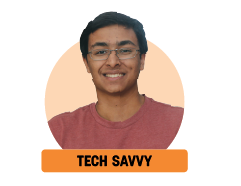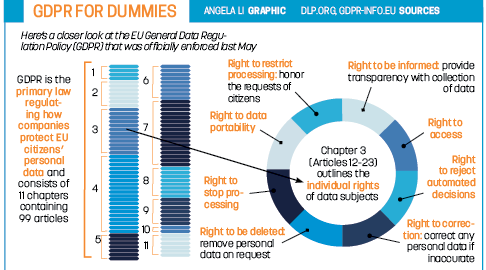The EU recently passed legislation called the general data Privacy Regulation (GDPR), which places tighter restrictions on the data that technology companies can collect and what they can do with it. This puts more power in the user’s hands to decide what companies are allowed to have their data and how they can use it.
Although this bill directly impacts the EU, many services we use will need to adapt, meaning these changes will indirectly affect CHS. While increased data usage regulations sound like the perfect defense against silicon-valley giants meddling with our personal information, the truth isn’t so black and white.
A common phrase in the technology industry is, “If you aren’t paying, you are the product.” This refers to the fact that many free services such as Instagram, YouTube and Gmail sell your personal data in order to make a profit. For example, if you listened to a Kanye West album, you are likely to be interested in hip-hop music, meaning you may be compelled to purchase Adidas sneakers.  This is information Adidas wants to know, and they are willing to pay to do so. But if, under the GDPR, a large percentage of users chose to opt out of data collection, these companies are giving out their services with nothing in return.
This is information Adidas wants to know, and they are willing to pay to do so. But if, under the GDPR, a large percentage of users chose to opt out of data collection, these companies are giving out their services with nothing in return.
This is heightened by the costs for companies to adjust to the GDPR guidelines in the first place. A survey conducted by Paul Hastings LLP estimates that the minimum cost to do business in the UK would be around $1 million.
With these large costs and lesser user data revenue to offset it, these firms will be forced to find the money from alternative means—namely charging you—the consumer.
Still, I don’t feel currently free services will immediately shift toward a pay-to-play model, as it would seem unusual for them to do so. But I would expect companies to find other ways to make money.
One of the internet’s crowning achievements is the democratization of education. A simple Google search yields millions of videos, blog posts and exercises, to learn everything from photography to physics. In other words, the GDPR may be hindering the success of the internet as a whole.
The views in this column do not necessarily reflect the views of the HiLite staff. Reach Armaan Goel at agoelhilite.org.


































![British royalty are American celebrities [opinion]](https://hilite.org/wp-content/uploads/2024/03/Screenshot-2024-03-24-1.44.57-PM.png)



















![Chelsea Meng on her instagram-run bracelet shop [Biz Buzz]](https://hilite.org/wp-content/uploads/2024/04/IMG_2446-1200x838.jpg)
![Review: Quiet on Set: The Dark Side of Kids TV is the long awaited exposé of pedophilia within the children’s entertainment industry [MUSE]](https://hilite.org/wp-content/uploads/2024/04/unnamed.jpg)
![Review: “The Iron Claw” cannot get enough praise [MUSE]](https://hilite.org/wp-content/uploads/2024/04/unnamed.png)
![Review: “The Bear” sets an unbelievably high bar for future comedy shows [MUSE]](https://hilite.org/wp-content/uploads/2024/03/unnamed.png)
![Review: “Mysterious Lotus Casebook” is an amazing historical Chinese drama [MUSE]](https://hilite.org/wp-content/uploads/2024/03/0.webp)
![Review in Print: Maripaz Villar brings a delightfully unique style to the world of WEBTOON [MUSE]](https://hilite.org/wp-content/uploads/2023/12/maripazcover-1200x960.jpg)
![Review: “The Sword of Kaigen” is a masterpiece [MUSE]](https://hilite.org/wp-content/uploads/2023/11/Screenshot-2023-11-26-201051.png)
![Review: Gateron Oil Kings, great linear switches, okay price [MUSE]](https://hilite.org/wp-content/uploads/2023/11/Screenshot-2023-11-26-200553.png)
![Review: “A Haunting in Venice” is a significant improvement from other Agatha Christie adaptations [MUSE]](https://hilite.org/wp-content/uploads/2023/11/e7ee2938a6d422669771bce6d8088521.jpg)
![Review: A Thanksgiving story from elementary school, still just as interesting [MUSE]](https://hilite.org/wp-content/uploads/2023/11/Screenshot-2023-11-26-195514-987x1200.png)
![Review: When I Fly Towards You, cute, uplifting youth drama [MUSE]](https://hilite.org/wp-content/uploads/2023/09/When-I-Fly-Towards-You-Chinese-drama.png)
![Postcards from Muse: Hawaii Travel Diary [MUSE]](https://hilite.org/wp-content/uploads/2023/09/My-project-1-1200x1200.jpg)
![Review: Ladybug & Cat Noir: The Movie, departure from original show [MUSE]](https://hilite.org/wp-content/uploads/2023/09/Ladybug__Cat_Noir_-_The_Movie_poster.jpg)
![Review in Print: Hidden Love is the cute, uplifting drama everyone needs [MUSE]](https://hilite.org/wp-content/uploads/2023/09/hiddenlovecover-e1693597208225-1030x1200.png)
![Review in Print: Heartstopper is the heartwarming queer romance we all need [MUSE]](https://hilite.org/wp-content/uploads/2023/08/museheartstoppercover-1200x654.png)






















![Review: Ladybug & Cat Noir: The Movie, departure from original show [MUSE]](https://hilite.org/wp-content/uploads/2023/09/Ladybug__Cat_Noir_-_The_Movie_poster-221x300.jpg)

![Review: Next in Fashion season two survives changes, becomes a valuable pop culture artifact [MUSE]](https://hilite.org/wp-content/uploads/2023/03/Screen-Shot-2023-03-09-at-11.05.05-AM-300x214.png)
![Review: Is The Stormlight Archive worth it? [MUSE]](https://hilite.org/wp-content/uploads/2023/10/unnamed-1-184x300.png)




![Seniors Jillian Rang and Athul Ramkumar practice their presentation at the DECA state competition on March 5, 2024. Arya Patel, DECA paper head and junior, said, As they [students] begin to make their final preparations, its important to remember that making it to this point is an incredible achievement.](https://hilite.org/wp-content/uploads/2024/04/IMG_8285-1200x800.jpg)
